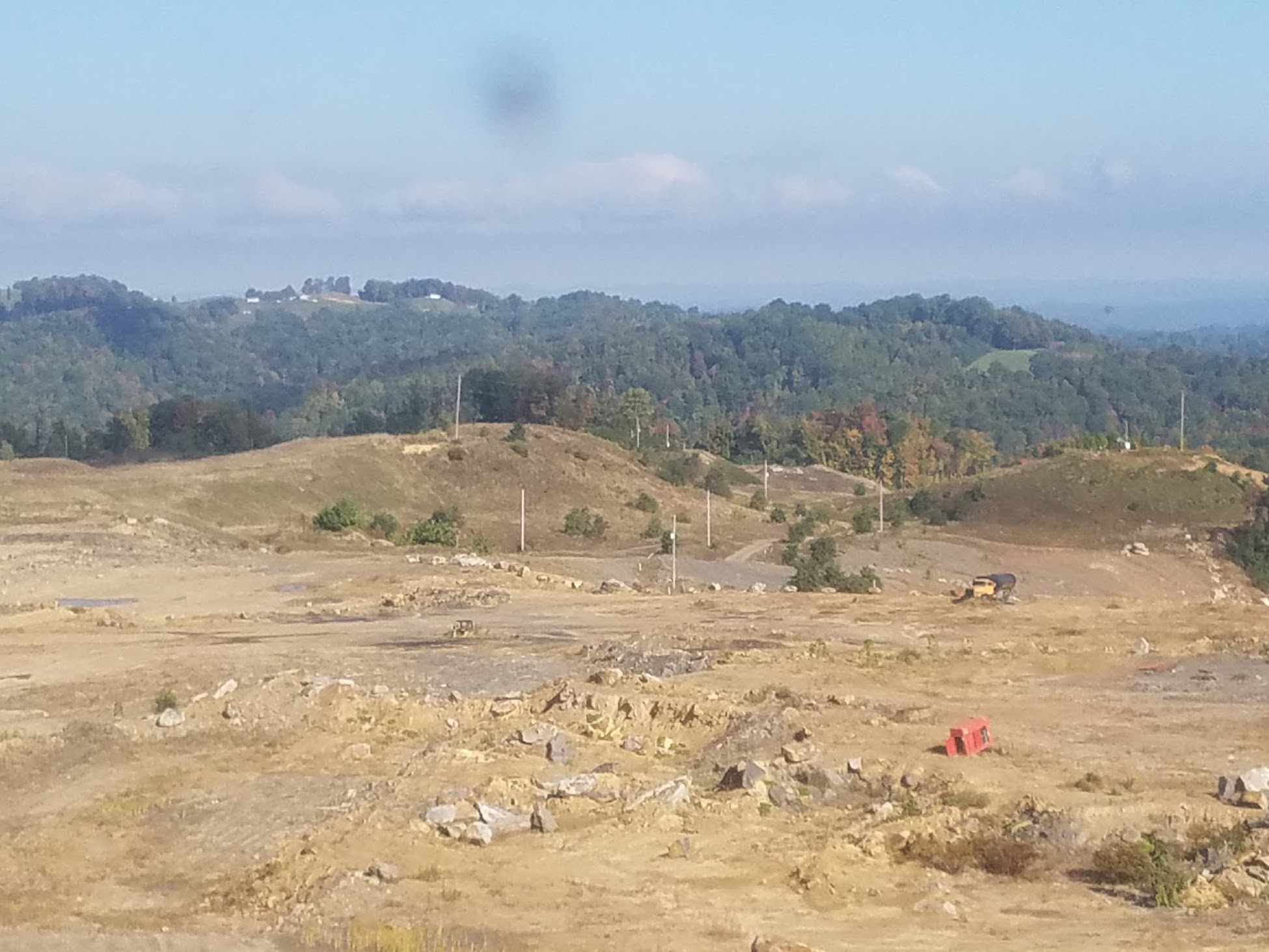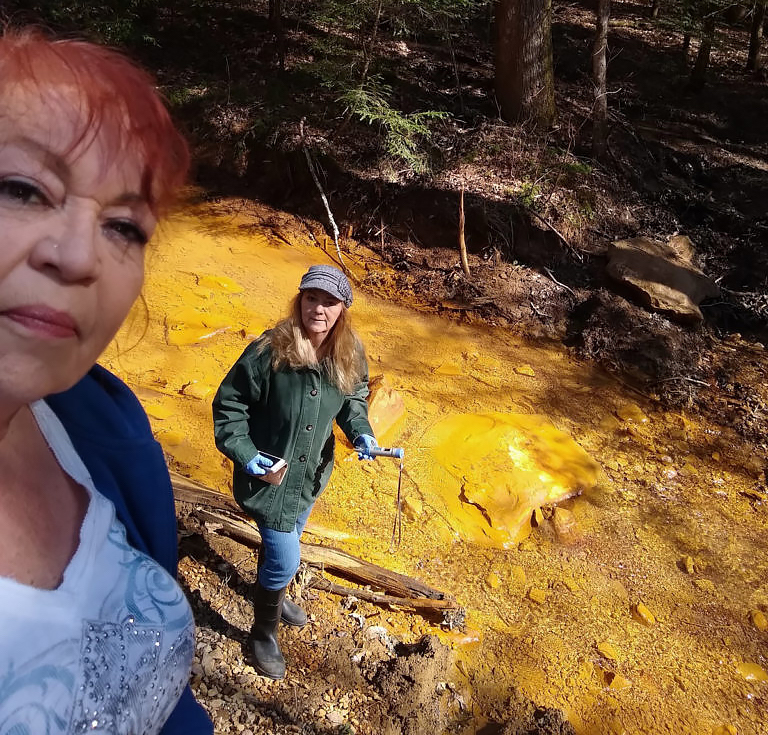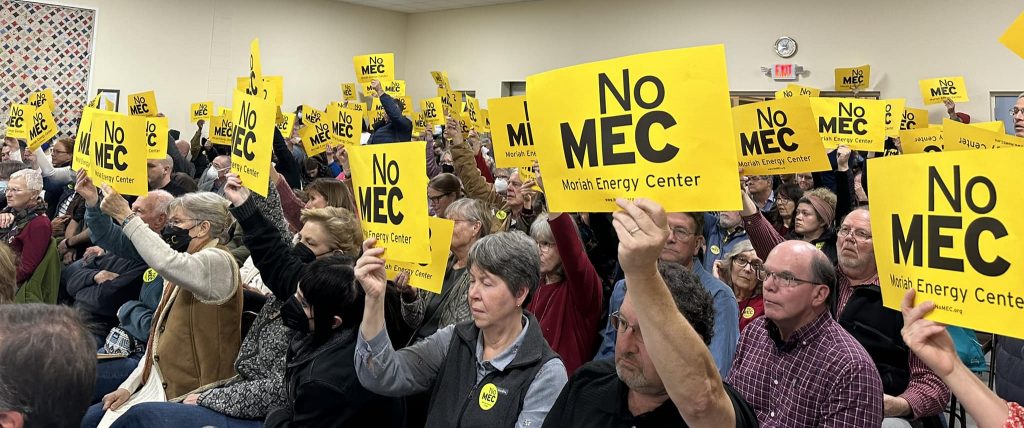Bankruptcy Proposal Would Dodge Mine Cleanup Laws

Reclamation remains incomplete at this former Blackjewel-affiliated Aily Branch coal mine permit in Southwest Virginia. This permit has not finished transferring to the new owner, Civil LLC, but it appears close. Photo by Matt Hepler
By Matt Hepler and Molly Moore
UPDATE, Jan. 11, 2020:
Following multiple objections to Blackjewel’s proposed Chapter 11 plan, Blackjewel filed an amended plan the morning of the December 17 hearing, striking the use of a reclamation trust. During the hearing, Judge Benjamin Kahn denied former Blackjewel CEO Jeff Hoops’ petition to move the bankruptcy proceeding from a Chapter 11 reorganization plan to a Chapter 7 liquidation plan, but did not rule on the proposed Chapter 11 plan, given the last-minute changes.
Blackjewel stated in a Dec. 23 filing that it was seeking to abandon all of its unsold coal permits, though exactly which permits remain unsold and untransferred remains unclear. Judge Kahn will again take up the issues of permit abandonment and the general bankruptcy plan during the January 15 court hearing.
It’s been well over a year since Blackjewel, LLC and its affiliates, including Revelation Energy, announced bankruptcy. The case that rattled the already-unstable Central Appalachian coal industry is now at a key juncture.
The result of upcoming court decisions will have a dramatic impact on thousands of acres of mine lands, nearby communities, and on the lives of former workers. Coal executives, financiers, related companies and federal agencies also have a stake in the outcome.
“Everybody’s wanting a piece of whatever is left of the pie,” says Ned Pillersdorf, an Eastern Kentucky lawyer. Pillersdorf is part of a legal team that represents approximately 1,100 Central Appalachian miners and 600 Wyoming miners who were laid off when the coal companies suddenly shut their doors on July 1, 2019.
Thursday marked the deadline for stakeholders to file objections to Blackjewel’s proposed Chapter 11 reorganization plan. One such objection was filed by a coalition of environmental and community groups, including Appalachian Voices, the publisher of The Appalachian Voice. A wide range of other stakeholders including the Kentucky Energy and Environment Cabinet, the U.S. Internal Revenue Service and federal creditors also objected.
It’s not just the creditors and other parties looking to make sure the company fulfills its obligations. The people currently representing Blackjewel are also engaged in what Pillersdorf describes as “legal warfare” against the company’s founder and former CEO Jeff Hoops.
On November 25, Hoops and his companies and family members filed a motion asking the court to change the nature of the bankruptcy from a Chapter 11 reorganization to a Chapter 7 liquidation plan. In the petition, Hoops and his attorneys argued that because of Blackjewel’s “lack of operating assets, permanent negative net cash flow, and continuing financial losses, there is no reason to continue this proceeding as a chapter 11 and incur the substantial and unnecessary administrative expenses attendant to doing so.”
The filing states that Blackjewel has just under $150,000 in unrestricted cash but owes nearly $15 million in healthcare claims, nearly $12 million in pension obligations and more than $26 million in unpaid professional fees. That’s in addition to $80 million in bankruptcy expenses and unknown amounts in unpaid taxes, permit violation fines and reclamation liabilities, a sum that is also certain to total in the millions.
For their part, Blackjewel’s current representatives allege wrongdoing on the part of Hoops and filed a lawsuit Dec. 10 seeking to recover what they allege are “fraudulent transfers” on the part of Hoops and his affiliates. They argue that prior to filing for bankruptcy in July 2019, Hoops drained Blackjewel’s assets into his family’s coffers, making the bankruptcy illegitimate from day one.
Pillersdorf agrees. “We don’t think they were ever in the red,” he says. “We just think this was the way to shed debt, and the debt is my clients’ compensation as well as [Blackjewel’s] environmental obligations.”
Now, Pillersdorf says, the key question is: “How much money can the people controlling Blackjewel today retrieve from Hoops and his companies?”
The answer will help to determine whether abandoned workers get their medical bills paid, whether and how millions of dollars in environmental cleanup gets done, whether landowners who leased their land to the coal companies are left liable for water pollution and unstable slopes, and more.
The next pivotal step comes at a federal bankruptcy hearing on Dec. 17, where Judge Benjamin Kahn will consider the various objections to Blackjewel’s Chapter 11 plan, as well as Hoops’ motion to convert the bankruptcy to Chapter 7. If the Chapter 11 plan survives in some form, Blackjewel’s high-priority creditors will need to vote on the plan by Dec. 23.
An Alarming Reclamation Proposal
A particularly contentious issue in Blackjewel’s Chapter 11 plan involves a proposal to create a new system to deal with mine reclamation that appears to bypass existing laws.
When Blackjewel and its affiliates filed for bankruptcy, they held 296 mine permits across Kentucky, Virginia, West Virginia and Wyoming. Those permits include surface coal mines as well as coal processing facilities and related infrastructure, and those permits come with the obligation to reclaim the sites to meet federal standards outlined in the Clean Water Act and Surface Mining Control and Reclamation Act. The total cost of this reclamation is unknown, but would likely land somewhere in the hundreds of millions. This estimate is based on a January 2020 study conducted by the state of Kentucky that found reclamation costs for just 20% of the company’s mines in that state would exceed the bonded amounts by about $38 million.
Forty-five Blackjewel permits remain unsold and as of Dec. 10, 187 have been sold but not yet transferred. Since Blackjewel filed for bankruptcy, some of these permits have accrued new, persistent environmental violations. As the number of violations grows and remains unaddressed, the threat of severe damages like landslides increases.
In its Chapter 11 filing, Blackjewel has proposed setting up a Reclamation Trust to address those 45 permits and any others that are not transferred. The Kentucky Energy and Environment Cabinet, the U.S. Internal Revenue Service, federal creditors, and environmental groups have roundly criticized this Reclamation Trust proposal in formal objections and other court filings.
In their Dec. 10 objection, the environmental and citizens groups expressed concern that the Reclamation Trust would be underfunded and blocked from pursuing other avenues to fund reclamation projects. The proposal also appears to allow the Reclamation Trust to skirt existing environmental laws.
“The way [Blackjewel has] it structured now, they are putting all of the responsibility for that reclamation into the Reclamation Trust and the trust is going to be funded only by the bond amounts on the permits that go into the trust,” explains Mary Cromer, attorney and deputy director of Appalachian Citizens’ Law Center, one of the groups involved in the objection.
In effect, the Reclamation Trust would place a limit that wouldn’t otherwise exist on the amount of money available for reclamation. Under federal surface mining law, when a company is in Blackjewel’s position and is unable to reclaim their mine sites, the company forfeits their reclamation bond for that permit, and the state mining agency can then use the bond to pay for cleanup.
Some states also have access to a pool bond, a fund that multiple companies pay into so that there is extra money available if an individual permit bond is not sufficient for reclamation costs. While there are serious concerns about the future solvency of state pool bonds in Central Appalachia, Kentucky’s current pool bond holds about $50 million, according to a June investigation by independent journalist Mark Olalde. These funds could help cover reclamation of the unsold Blackjewel mines, though doing so would leave less money available to deal with the next wave of abandoned permits.
Federal law also allows states to seek the assets of corporate officers to cover the company’s mine cleanup liabilities — the proposed Reclamation Trust would shut down that avenue as well.
“Because these [permits] are being put in the Reclamation Trust, it looks like the state’s going to be unable to try to get money from the bond pool fund or to go after Jeff Hoops or any of the other executive officers who were responsible for getting the company into this position,” Cromer says.
“We’re also concerned with the language that is in the plan,” she continues. “It seems to not only ensure that there’s going to be this trust that will be underfunded, also it says that the environmental permits will be extinguished.”
By seemingly stating that reclamation work would be done without the Clean Water Act and Surface Mining Control and Reclamation Act permits that are currently required, the Chapter 11 plan’s Reclamation Trust appears to prevent regulators from enforcing those environmental laws.
How many permits remain at large?
The number of permits that would be included in the Reclamation Trust is still an open question, and the potential permits include some with extensive pollution problems that will likely be costly to remediate.
In September, a federal judge ordered that all permit transfers from the purchasers of Blackjewel property be complete by Oct. 31. Yet six weeks later, 187 permits remain in limbo, with the permit transfer process in various states of completion.
Kopper Glo Mining purchased several permits in Kentucky and Virginia and completed all of its permit transfers before the deadline. Eagle Specialty Materials completed 21 transfers, but has more than 45 permit transfers that are still under review. Other smaller companies like Black Mountain Resources, LLC have so far been unable to complete their permit transfers due to difficulty in obtaining bonding, as fewer bonding companies wish to insure mining operators due to coal’s decline.
A subset of four permits held by Eagle Specialty Materials are not on the same timeframe as the rest due to legal issues. This includes two permits, locally known as Greenwood, that comprise a coal processing site in McCreary County, Kentucky. The site has a severe acid mine drainage problem and is set up to continuously pump water in a closed-loop system so that the polluted water never leaves the site.
After Blackjewel filed for bankruptcy, the operator turned off the pumps for a time, resulting in polluted water flowing into Daniel Boone National Forest. The situation was spotted by volunteers Teri Blanton and Joanne Golden Hill, and the state of Kentucky issued cessation orders after the advocates brought it to their attention. Now, the pumps are turned back on, but the need for maintenance and remediation remains.
Sites like Greenwood are a particular concern for environmental and community groups. During the Sept. 10 hearing, a former Eagle Specialty Materials owner stated that the company was concerned about possible Clean Water Act violations if Eagle Specialty Materials acquired the permits. They also claimed they were evaluating their options for what to do about that site. The company claimed that they hired two respected hydrology consultants to inspect the site, and both had failed to come up with a remediation plan. Greenwood is one of the sites that could end up in the Reclamation Trust as the permit has not yet transferred and the cost to correct the ongoing water pollution would likely be very high and ongoing for an indefinite period of time.

Joanne Golden Hill and Teri Blanton monitor water quality at Copperas Fork in Daniel Boone National Forest in 2019. Acid mine drainage was coming from the Greenwood permit, one of the many permits still in limbo in the Blackjewel bankruptcy. Photo by Joanne Hill
In their objection, the environmental and citizens groups point out particular concerns with how the Reclamation Trust proposal would impact the permits that could be included and the communities downstream. But with other regional and national coal companies in unstable condition, Blackjewel’s plan could have far-reaching implications.
Peter Morgan is a senior attorney with the Sierra Club, one of the groups objecting to the Chapter 11 plan, and he is worried that if Blackjewel is allowed to proceed with the the Reclamation Trust approach, “it’s going to be a model that’s followed in a lot of other mine operator bankruptcies.”
Morgan notes that one of the main motivations for Congress to pass the federal surface mining law in 1977 was to create a mechanism for dealing with abandoned permits. “That system says the state regulator becomes responsible and there should be some kind of a financial bond that they can use to pay for it,” he says.
“We’re just really nervous about any approach like what Blackjewel’s proposing that would try to do an end-run around that system. We’re specifically concerned about what happens in Blackjewel’s bankruptcy, but we also have broader concerns about the precedent this is going to set for all of the coming bankruptcies.”
Judge Kahn could allow other components of Blackjewel’s Chapter 11 plan to proceed but block the creation of a Reclamation Trust and allow the rest of the permits to be abandoned and move through the existing mine reclamation system. Morgan notes that there are no good options for advocates of mine reclamation at this point in this bankruptcy case.
“We think the least bad option is for all of the remaining permits to be abandoned, for the state regulators to take responsibility and for them to foreclose on whatever bonding is available and use that money to complete reclamation,” he says.
If Judge Kahn accepts the Chapter 7 motion from Hoops, the reclamation outcome would be similar — Blackjewel would essentially abandon its unsold mine permits and the state would pursue cleanup with the forfeited bonds. In that scenario, attempts to resolve other components of the bankruptcy would begin again under the Chapter 7 framework.
Workers Seek Restitution
Environmental liabilities are far from the only obligations at stake. Approximately 1,700 former workers were abruptly laid off when Blackjewel and its affiliates declared bankruptcy July 1, 2019. In September, Ned Pillersdorf and the other attorneys representing the miners announced a proposed $17.3 million settlement of a class-action lawsuit filed under the Worker Adjustment and Retraining Notification Act, a law that requires employers to give advance notice of plant closings and mass layoffs.
Pillersdorf and his team are still negotiating for compensation for two months’ worth of health insurance claims from the summer of 2019, when the companies dropped their former employees’ health coverage.
“They assume they have coverage and then suddenly they’re learning they don’t have coverage and they’ve got a hundred thousand dollars of medical bills,” Pillersdorf says.
Whether or not the class-action settlement goes through is unknown. It depends in part on factors like the ongoing medical bill negotiations. If the judge initially accepts the settlement, there will be an open hearing where people would have the opportunity to opt out or complain, and the judge could still decide to reject the settlement.
The former workers scored a major victory in October 2019 when they won a total of $5.5 million in back pay for hours worked between June 10, 2019 and the July 1, 2019 bankruptcy filing. After the sudden bankruptcy declaration, the companies clawed back the money from workers’ bank accounts, leaving some in the red.
That win only came after extraordinary circumstances — workers blocked train tracks for nearly two months to stop Blackjewel from transporting and selling coal that they mined. The protest attracted national and international publicity and led the U.S. Department of Labor to get involved, which gave Pillersdorf’s team more leverage to recoup the miners’ back wages.
“We got those guys fully paid, which I thought was fabulous,” he says, noting that “the bankruptcy laws are stacked against wage earners.”
“Having said that, most of them had lost their jobs,” Pillersdorf says. “I think at one point only 40% had found other mining jobs. I’m sure that number has gone down since. It has been a humanitarian crisis and we’re talking [Kentucky’s] Letcher, Harlan and Leslie counties — those are three of the poorest counties in the nation. This couldn’t have hit in a worse place.”
Now, whether those miners receive more compensation is one of the many outcomes that hinge on how much money the current Blackjewel owners can recoup from Hoops and his other companies.
“In my view, Hoops just shamefully manipulated the system,” Pillersdorf says. “He drained money out and it all seemed to end up in his pocket and his family’s pocket.”
Related Articles
Latest News

Leave a comment
Your email address will not be published. Required fields are marked *




